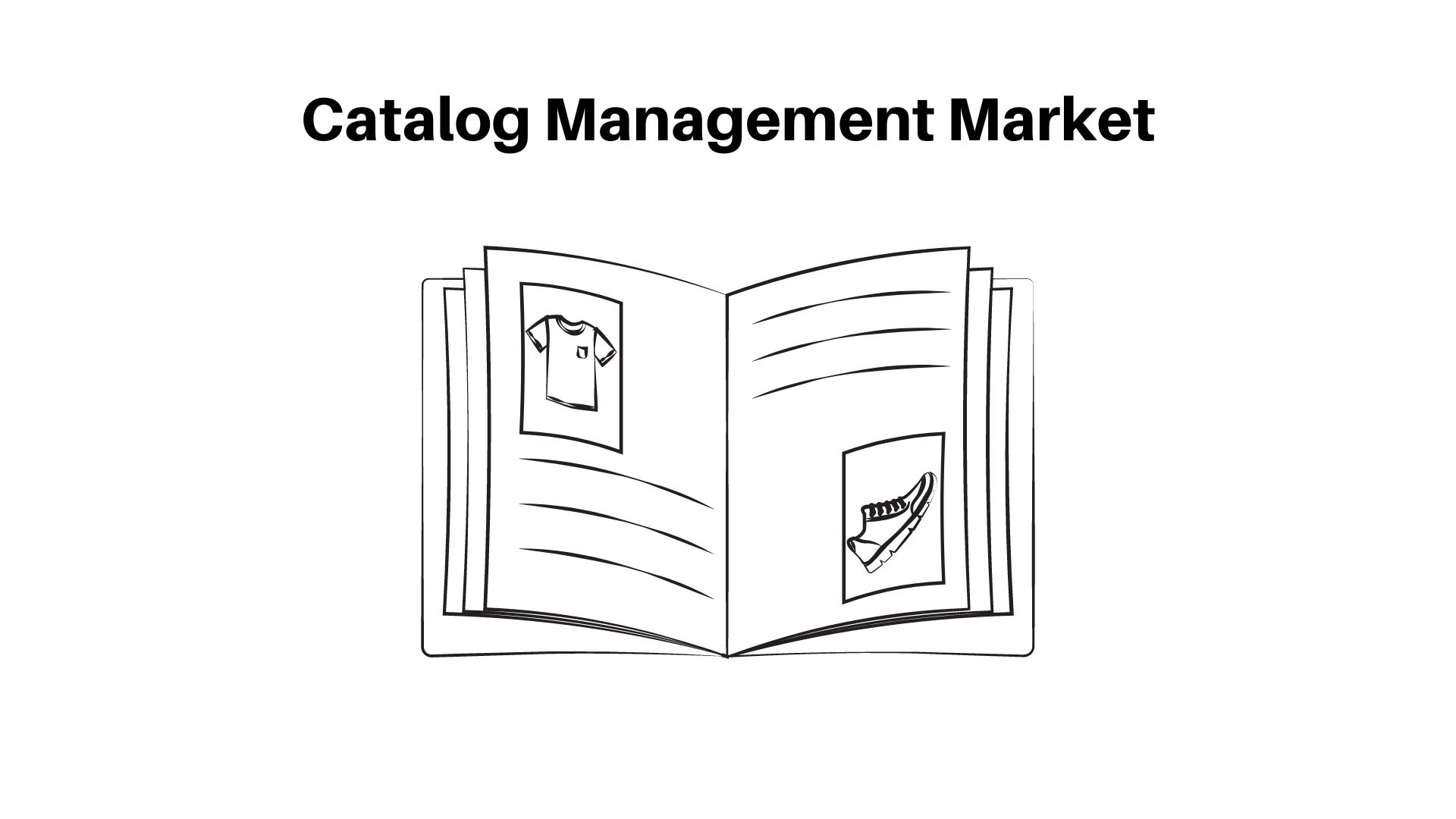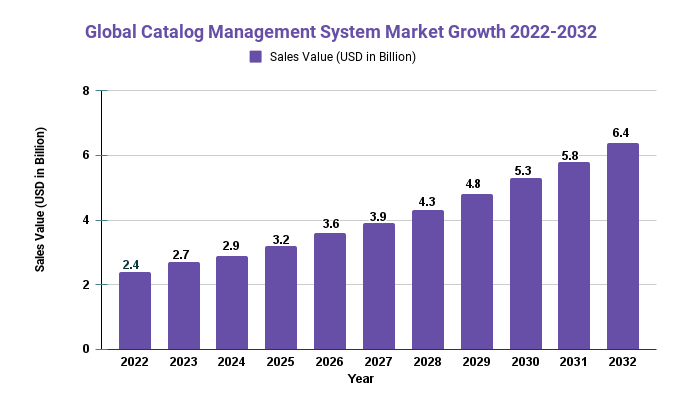Catalog Management System Market Expected To Reach CAGR Value Of Over 10.2% By 2032

Page Contents
Market Overview
Published Via 11Press: The Catalog Management System Market size is expected to be worth around USD 6.4 Bn by 2032 from USD 2.4 Bn in 2022, growing at a CAGR of 10.2% during the forecast period from 2022 to 2032.
The catalog management market is a rapidly growing industry that offers businesses advanced solutions for managing and organizing their product catalogs. This market has seen significant growth in recent years, as more companies have recognized the importance of effectively managing their product data to improve sales and customer satisfaction. With the increasing demand for eCommerce platforms, catalog management has become a crucial part of any successful business strategy.
In this day and age, consumers expect to find accurate and up-to-date information about products online. Catalog management software helps businesses meet these expectations by providing them with the tools to manage product data across multiple channels, including websites, social media platforms, and mobile apps. It also allows businesses to streamline their internal processes by automating tasks such as updating prices or adding new products saving time and minimizing errors.
Catalog management systems are becoming increasingly sophisticated due to advancements in artificial intelligence (AI) technology.
Request For Sample Report Here: https://market.us/report/catalog-management-systems-market/request-sample/

Key Takeaways
- The Catalog Management System market is expected to experience rapid growth over the coming years due to factors such as the increasing adoption of e-commerce platforms, an increasing need for efficient data management, and omnichannel retailing's growing popularity.
- Catalog management solutions are becoming more and more popular among businesses to streamline and centralize their product information management processes. Doing so allows companies to guarantee accurate and up-to-date product data is available across all sales channels, such as online marketplaces, social media platforms, and physical stores.
- Cloud-based catalog management solutions are becoming increasingly popular, due to their numerous advantages such as scalability, flexibility, and cost efficiency. Furthermore, cloud-based systems can be accessed remotely which makes it simpler for businesses to manage product data across multiple locations.
- Catalog management solutions are most in demand in North America, followed by Europe and Asia Pacific. This is due to the large retail and e-commerce industries present there.
- Key players in the catalog management system market include Salsify, Oracle Corporation, International Business Machines Corporation, Fujitsu Limited, IBM Corporation, ServiceNow Inc., Salsify Inc., Sellercloud Inc., Proactis Holdings Limited, SAP SE, Coupa Software Inc., CA Technologies, Amdocs, Other Key Players. These firms are investing heavily in research and development to offer cutting-edge catalog management solutions that can adapt to businesses' evolving requirements.
Regional Analysis
- The North American market for Catalog Management Systems is the largest, with the US being its major contributor. This region houses many retail and e-commerce businesses that require efficient catalog management solutions to maintain product information across various channels. Furthermore, the increasing adoption of cloud-based catalog management solutions within this region is fueling market growth in this region.
- The European market for Catalog Management Systems is particularly strong, driven by large retail and e-commerce businesses in countries like Germany, France, and the UK. Furthermore, the increasing adoption of mobile commerce in this region is further fueling market growth as businesses require effective catalog management solutions to manage product data across various mobile channels.
- The Asia Pacific market for Catalog Management Systems is expected to witness significant growth over the coming years, driven by the increasing adoption of e-commerce platforms across the Asia Pacific. Countries such as China and India are driving this expansion with their growing numbers of online shoppers and the need for effective product data management solutions.
- The Middle East and Africa region is anticipated to witness significant growth in the Catalog Management System market, driven by the increasing adoption of e-commerce platforms in this region. The growth of online marketplaces as well as an increasing need for efficient catalog management solutions across retail stores and e-commerce businesses are some major factors fueling market expansion within this region.
- The Latin American market for Catalog Management Systems is expected to experience moderate growth over the coming years due to the increasing adoption of e-commerce platforms and an increasing need for efficient product data management solutions in this region. Brazil is projected to be one of the major contributors to market expansion within this region.
Drivers
- Rising E-Commerce Industry: The rapid expansion of the e-commerce sector is a major force in the Catalog Management System market. E-commerce businesses require effective catalog management solutions to manage their product data across various sales channels, such as online marketplaces, social media platforms, and physical stores.
- Product Data Management: As product data complexity and the number of sales channels, grow, businesses are increasingly turning to catalog management solutions to centralize and simplify their product data management processes. Catalog management systems help companies ensure accurate, up-to-date product info is accessible across all sales channels.
- Omnichannel Retailing: The rise of omnichannel retailing, where businesses offer customers an integrated shopping experience across all sales channels, is fueling the expansion of the Catalog Management System market. Effective catalog management solutions are necessary for businesses to achieve omnichannel selling as they allow companies to manage product data across multiple channels.
- Cloud-Based Solutions: Cloud-based catalog management solutions are becoming more and more popular, due to their numerous advantages such as scalability, flexibility, and cost-effectiveness. Furthermore, these solutions can be accessed remotely which makes it simpler for businesses to manage product data across multiple locations.
- Growing Demand for Personalization: The growing desire for personalized shopping experiences has spurred the adoption of catalog management solutions. These tools enable businesses to create and manage personalized catalogs for their customers, giving them a tailored shopping experience tailored to their individual needs and preferences.
- Increasing Adoption of AI and Machine Learning: The rising adoption of artificial intelligence (AI) and machine learning (ML) in catalog management solutions is propelling the growth of this market. These technologies enable businesses to automate and optimize their product data management processes, reducing manual effort while increasing efficiency.
Browse the summary of the report and Complete Table of Contents (TOC): https://market.us/report/catalog-management-systems-market/table-of-content/
Restraints
- Lack of Awareness: One of the main challenges faced by the Catalog Management System market is the lack of awareness about the benefits of these solutions. Many businesses are not aware of the advantages of catalog management solutions and may not consider them essential tools for their operations.
- Integration Issues: Integrating catalog management solutions with existing systems and processes can be complex and time-consuming. This can be a significant barrier for businesses looking to adopt these solutions.
- Data Security Concerns: Catalog management solutions involve managing sensitive and confidential product data. As such, data security concerns may prevent some businesses from adopting these solutions.
- High Costs: Implementing and maintaining catalog management solutions can be expensive for some businesses, especially for small and medium-sized enterprises (SMEs). The high costs associated with these solutions may prevent some businesses from adopting them.
- The lack of Skilled Workforce: Catalog management solutions requires skilled professionals to operate and manage them effectively. The lack of a skilled workforce in this area can be a significant restraint for some businesses.
- Resistance to Change: Some businesses may be resistant to change and may prefer to continue using traditional methods of managing their product data. This resistance can be a significant challenge for businesses looking to adopt catalog management solutions.
Opportunities
Increasing Demand for Digital Transformation: The demand for digital transformation is growing rapidly, with businesses looking to adopt new technologies to improve their operations. Catalog management solutions can help businesses streamline their product data management processes and achieve digital transformation.
Growing Adoption of Cloud-based Solutions: The adoption of cloud-based catalog management solutions is increasing rapidly, driven by the benefits of scalability, flexibility, and cost-effectiveness. This trend presents an opportunity for vendors to offer cloud-based solutions to businesses looking to adopt catalog management solutions.
Rise of Mobile Commerce: With the increasing use of smartphones and tablets, mobile commerce is becoming more popular. Catalog management solutions can help businesses manage their product data across multiple mobile channels, providing customers with a seamless mobile shopping experience.
Demand for Personalization: The demand for personalized shopping experiences is growing, with businesses looking to offer personalized catalogs to their customers. Catalog management solutions can help businesses create and manage personalized catalogs, presenting an opportunity for vendors to offer personalized solutions to businesses.
Increasing Adoption of AI and Machine Learning: The adoption of AI and machine learning in catalog management solutions is growing rapidly, providing an opportunity for vendors to offer advanced solutions that can automate and optimize product data management processes. Growing E-commerce Industry, The e-commerce industry is growing rapidly, presenting an opportunity for vendors to offer catalog management solutions to businesses looking to manage their product data across multiple sales channels.
Challenges
- Integration Issues: Integrating catalog management solutions with existing systems and processes can be complex and time-consuming. Businesses need to ensure that the solution they choose integrates seamlessly with their existing systems.
- Data Security Concerns: Catalog management solutions involve managing sensitive and confidential product data. As such, data security concerns may prevent some businesses from adopting these solutions. Vendors need to provide robust security features to address these concerns.
- High Costs: Implementing and maintaining catalog management solutions can be expensive for some businesses, especially for small and medium-sized enterprises (SMEs). Vendors need to offer affordable solutions that cater to the needs of SMEs.
- Lack of Awareness: Many businesses are not aware of the benefits of catalog management solutions, which can be a significant challenge for vendors. Vendors need to educate businesses about the advantages of these solutions.
- Resistance to Change: Some businesses may be resistant to change and may prefer to continue using traditional methods of managing their product data. Vendors need to provide solutions that are easy to use and integrate seamlessly with existing processes to overcome this challenge. Lack of Skilled Workforce, Catalog management solutions require skilled professionals to operate and manage them effectively.
- The lack of a skilled workforce in this area can be a significant challenge for businesses. Vendors need to provide training and support to businesses to address this challenge.
Recent Development
- September 2022 Amberoon's Statum KPI SaaS app has been made available to purchase through the IBM Cloud Catalog. The company creates privacy management solutions and compliance for banks and credit unions. These integrated billing services have been made accessible through IBM Cloud Catalog. This allows users to create a service instance. IBM offered the service catalog platform to Amberoon Statum and allowed financial service providers across the country to explore this solution. Acquia has released new features for Acquia DAM and Channel Portals in
- September 2022. Acquia has made it easy for companies to share secure, brand-branded content. Each partner can use the current digital product catalogs to increase sales and ensure that products are properly displayed in the market. The current product content is essential for websites, in-store displays, and sales interactions as well as email marketing. Channel Portals allow a business user to quickly filter a product catalog to find the information and materials each group needs to promote and sell products.
Report Scope
| Report Attribute | Details |
| The market size value in 2022 | USD 2.4 Bn |
| Revenue forecast by 2032 | USD 6.4 Bn |
| Growth Rate | CAGR Of 10.2% |
| Regions Covered | North America, Europe, Asia Pacific, Latin America, and Middle East & Africa, and the Rest of the World |
| Historical Years | 2017-2022 |
| Base Year | 2022 |
| Estimated Year | 2023 |
| Short-Term Projection Year | 2028 |
| Long-Term Projected Year | 2032 |
Key Market Segments
Type
- Product Catalog
- Service Catalog
Component
- Solution
- Service
- Professional Service
- Managed Service
Deployment Type
- On-Premise
- Cloud
Organization Size
- Small & Medium Enterprises
- Large Enterprises
Application
- BFSI
- IT & Telecom
- Retail & e-Commerce
- Media & Entertainment
- Other Applications
Key Market Players
- Salsify
- Oracle Corporation
- International Business Machines Corporation
- Fujitsu Limited
- IBM Corporation
- ServiceNow Inc.
- Salsify Inc.
- Sellercloud Inc.
- Proactis Holdings Limited
- SAP SE
- Coupa Software Inc.
- CA Technologies
- Amdocs
- Other Key Players
Frequently Asked Question
What is the market study period?
The Catalog Management System Market is studied from 2017 – 2032.
What is the growth rate for the Catalog Management System Market?
The Catalog Management System Market is growing at a CAGR of 10.2%
Which region experiences the highest rate of growth in the Catalog Management System Market?
Asia Pacific is growing at the highest CAGR over 2022- 2032.
Which region is the largest in the Catalog Management System Market?
North America holds the highest share in 2022.
Who are the major players in the Catalog Management System Market?
Salsify, Oracle Corporation, International Business Machines Corporation, Fujitsu Limited, IBM Corporation, ServiceNow Inc., Salsify Inc., Sellercloud Inc., Proactis Holdings Limited, SAP SE, Coupa Software Inc., CA Technologies, Amdocs, Other Key Players
The team behind market.us, marketresearch.biz, market.biz and more. Our purpose is to keep our customers ahead of the game with regard to the markets. They may fluctuate up or down, but we will help you to stay ahead of the curve in these market fluctuations. Our consistent growth and ability to deliver in-depth analyses and market insight has engaged genuine market players. They have faith in us to offer the data and information they require to make balanced and decisive marketing decisions.



